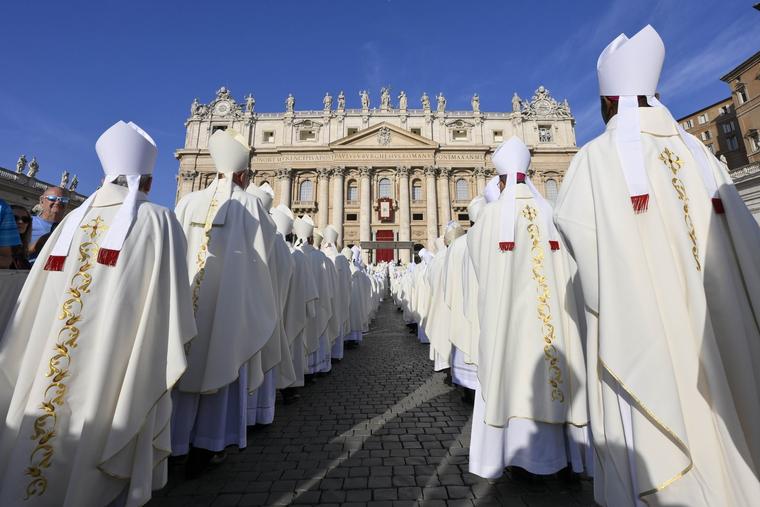The ongoing military tensions between the Israel Defense Forces and Hezbollah have escalated dramatically, creating a precarious situation for Lebanon, including its Christian communities.
This turmoil poses a significant risk not only to local lives but also threatens to affect the participation of Eastern Catholic patriarchs from Lebanon at the upcoming Synod on Synodality.
Arrival at the Vatican
As the second session of the 16th General Assembly of the Synod of Bishops kicks off with a retreat on Monday, representatives from Lebanon, including Eastern Catholic patriarchs, were expected to fly to Rome in the coming days.
However, flight cancellations from most airlines to Beirut complicate this plan.
Despite assurances from Lebanon’s caretaker Minister of Public Works and Transportation, Ali Hamieh, that Beirut International Airport—the nation’s sole civilian airport—is operational, locals remain apprehensive.
With recent airstrikes targeting Hezbollah throughout Lebanon, there’s growing fear that the airport could also be at risk, or that the Lebanese government may choose to close it for safety.
Possible Delays for Patriarchs
If the situation at the airport worsens, the patriarchs could find themselves unable to reach Rome in time for the Synod.
Typically, Eastern Catholic patriarchs attend these synods “ex officio,” meaning they automatically hold a place due to their roles as heads of their respective Churches rather than being appointed by the pope or a bishops’ conference.
According to the list of anticipated participants released by the synod’s general secretary, prominent figures like Ignace Youssef III Younan from the Syriac Catholic Church, Youssef Absi from the Melkite Catholic Church, and Raphaël Bedros XXI Minassian from the Armenian Catholic Church are expected to attend.
However, the absence of Maronite Patriarch Cardinal Béchara Boutros Raï raises questions, as his reasons for not attending remain unclear.
Confirmations and Conditions
Despite the challenges, other patriarchs are planning their journeys to Rome.
Bishop Flaviano Rami Al-Kabalan, representing the Syriac Catholic Patriarchate at the Holy See, confirmed that Younan is expected to arrive.
The Melkite Patriarchate stated that Absi would be in the Vatican next week, contingent on aviation conditions.
Additionally, Charbel Bastoury from the Armenian Catholic Patriarchate indicated that Minassian’s participation depends on reassurances regarding the safety of the situation in Lebanon, which could delay his arrival.
Concerns Over Representation and Influence
The risks posed by the current circumstances extend beyond mere travel difficulties; they could significantly impact the influence of Eastern Catholic Churches at the Synod on Synodality.
The discussions that will shape the final document sent to Pope Francis rely heavily on the participation of the patriarchs.
The presence of Younan, Absi, and Minassian is particularly crucial, given their conservative stances on contentious topics like the ordination of women and same-sex unions.
Experience and Authority
As leaders of autocephalous Churches, these patriarchs command great respect among cardinals, Vatican officials, and the Roman Curia.
They also preside over synodal Churches that hold annual bishops’ synods, during which they make critical decisions regarding potential bishop nominations from their communities.
This experience will be invaluable as they navigate the discussions centered on synodality—the primary focus of the upcoming assembly.
Representation from the Maronite Church
Additionally, two bishops are set to represent the Maronite Church in Rome: Bishop Paul Rouhana, the patriarchal vicar of Sarba, and Bishop Mounir Khairallah of Batroun.
The Maronite Church recently conducted a synodal process addressing the role of women, resulting in a document advocating for women’s diaconate, aligning with ancient Eastern traditions.
Voices of Determination
A number of other Lebanese representatives, including theologians and facilitators from continental assemblies, are also scheduled to attend the Synod’s second session.
When approached by ACI Mena regarding the risks associated with traveling to the airport, representative Rita Kouroumilian responded with unwavering faith, stating, “God is my strength; we will not fear.
As God has never abandoned us, He will not leave us now. If He wants us to attend the synod, we will go.”
Looking Ahead
As the situation unfolds, the uncertainty looms over the ability of these Church leaders to represent their communities effectively at the Synod.
Their voices and experiences are crucial in shaping discussions that could impact the future of Eastern Catholic Churches amid ongoing conflict.
